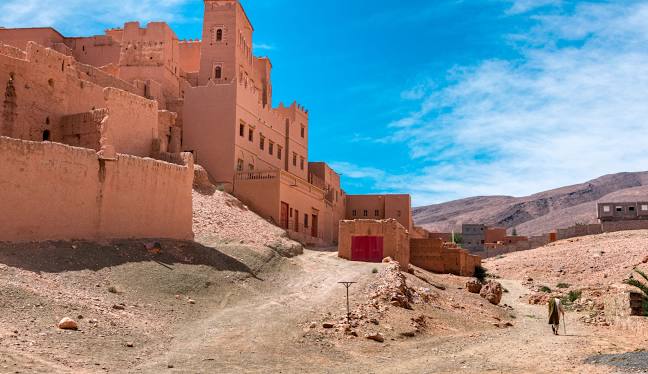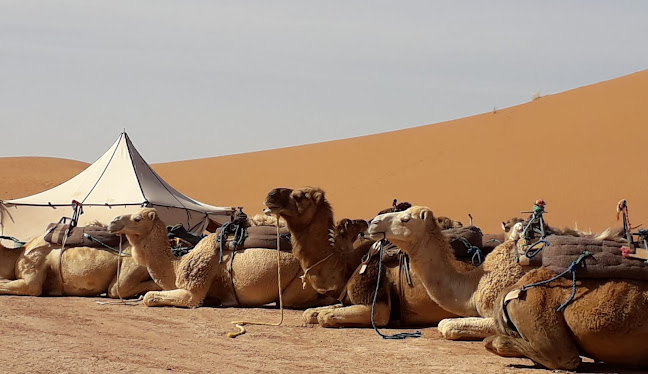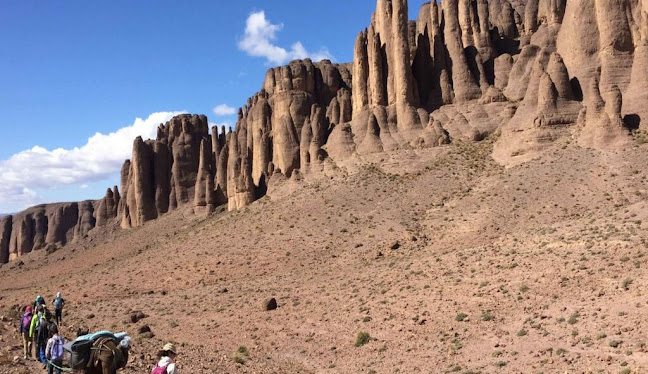Morocco Zagora, a small city in the Draa Valley of southern Morocco, holds a special charm that blends history, desert landscapes, and cultural richness. Located about 350 kilometers southeast of Marrakech, it is often referred to as the gateway to the Sahara. Home to Kasbah of Peace, Zagora represents not just a destination but the beginning of a journey into the endless dunes of the desert. Its name is tied to the nearby mountain Djebel Zagora, from which the town takes its identity. With its striking scenery, traditional architecture, and historic significance, it captures the essence of Morocco’s desert heritage.
Morocco Zagora
The history of Morocco Zagora is deeply rooted in the ancient trans-Saharan trade routes. For centuries, caravans laden with gold, salt, spices, and other goods passed through this region on their way to Timbuktu. In fact, Zagora is famously associated with the saying painted on an old sign : ‘Tombouctou, 52 jours’, indicating that it took 52 days by camel caravan to reach Timbuktu from this very spot. Although modern transport has replaced these slow journeys, the sign remains a cultural landmark and a reminder of Zagora’s importance in the history of commerce and cultural exchange across the Sahara.
Geographically, Morocco Zagora sits in a valley dominated by the Draa River, which carves its way through the arid desert and provides life to date palm groves and small agricultural fields. The lushness of the valley contrasts beautifully with the surrounding dry mountains and sand dunes, creating a unique environment. The Draa Valley is one of the longest rivers in Morocco, and its presence allowed the development of traditional fortified villages made of mud brick, that still stand as a testament to Berber and Arab architecture.
These fortresses, along with the palm groves, have earned the region admiration for its authentic character and its ability to showcase how people adapted to the harsh desert environment. Culturally, Morocco Zagora is home to a mix of Arab, Berber, and Sahrawi traditions. The town hosts colorful festivals, such as the Moussem of Sufi saint Moulay Abdessalam Ben Mchich, which attract pilgrims and visitors alike. Music and dance play an important role in Zagora’s cultural identity, with Gnawa rhythms, desert chants, and traditional instruments often filling the air during celebrations.
The traditional markets are also vibrant places where one can find local crafts, spices, textiles, and pottery. Walking through these offers a glimpse into the everyday life of the people of Morocco Zagora and their deep connection to both the land and the Sahara. Tourism has become an increasingly important part of Zagora’s identity. Many visitors come to explore the nearby dunes of Tinfou and Erg Chigaga, where camel treks and desert camps offer an authentic experience of the Sahara.
Spending a night under the stars in these desert camps is often considered a highlight of a trip to Morocco Zagora. The vast sky, unpolluted by city lights, creates a magical atmosphere that leaves a lasting impression. Adventure seekers also use Zagora as a starting point for off-road trips, hiking expeditions, and cultural tours into more remote areas of southern Morocco. The climate in Zagora is typically desert-like, with hot summers and mild winters.
Daytime temperatures can soar well above 40 degrees Celsius in the summer months, making spring and autumn the most favorable seasons for visiting. Despite the heat, the town’s architecture, with thick walls and small windows, reflects centuries of knowledge in building homes suited to desert life. The rhythm of life in Zagora is slower, shaped by the environment and the need to adapt to the desert’s challenges. Modern Zagora balances tradition with development. While the town has grown to include hotels, restaurants, and improved infrastructure for tourism, it still retains its authenticity.
The people are known for their hospitality, and many visitors remark on the warmth and friendliness of the locals. This combination of tradition and modern convenience makes Morocco Zagora a comfortable yet deeply cultural place to explore. Zagora is more than just a town, but a crossroads where history, geography, and culture meet. Its role as the starting point of ancient caravan routes gives it a unique place in Moroccan history. Its landscapes, from palm groves to desert dunes, reflect the resilience of life in harsh conditions, and its people, traditions, and festivals reveal a vibrant cultural identity that continues to thrive.




